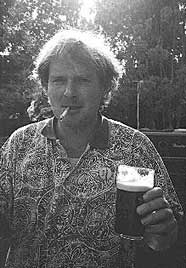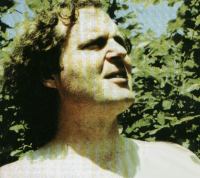
Pete Shaughnessy
r.i.p.
(September
14 1962 - December 15 2002)

photo:
from SchNEWS website dedicated to Pete
CONTENTS
Click to view -
Inquest details
Pete's
"Into
the Deep End"
Southwark Mind and Mad Pride tributes and concerts
London Evening Standard article about Pete/Mad
Pride
Website dedicated to Pete by SchNews
Photo
published with obituaries in The Big Issue and The Guardian
Photo
from the SchNews website dedicated to Pete
Obituaries
and tributes published in newspapers/journals:
The
Big Issue The
Guardian Mental
Health Today
MindLink
obituary published
on the web in Mental
Health Media
tributes published on the web in YearZero,
Zyra
and Royal
College of Nursing,
Virtuall.org,
The Pork-Bolter
Pete Shaughnessy died on 15 December 2002, after being hit by a train at Battersea Park station, London. An inquest into his death was held at the Coroner's Court, 65 Horseferry Road, London SW1, Thursday, 10 April 2003, starting at 9.30am and lasting about two hours.
An inquest is a public hearing and anyone who wishes may attend -
and indeed speak.. For more information about the purpose of inquests and powers of the coroner, go to the City Coroner page of the Corporation of London website.
See also INQUEST a charity dedicated to monitoring and reform of inquest procedures.
Because this was a "railway death" a jury sat with the Coroner, Dr Paul A Knapman. to hear the evidence which was given by various people, including Pete's long time friend, Sherry Allen, who was expecting him to visit her in London on the day he died. Andrew Bessant from the Acre Day Hospital in Worthing, West Sussex, also gave evidence; he was the last person to see Pete alive on Friday 13 December at the Day Hospital.
The driver whose train killed Pete also gave evidence. I had been in contact with the Coroner's Office since January and sent a number of letters and documents - including Southwark Mind's commemorative Newsletter and the obituaries published in The Big Issue, The Guardian and Mental Health Today. I'd had no indication beforehand that I would be asked to speak but the Coroner did invite me to do so (although clearly a bit unhappy about me "using the inquest to campaign" as he put it). I felt intimidated by his attitude but grateful that I had been invited to speak, so simply read from a paragraph from the last letter I had written to him which said: "I believe that Mr Shaughnessy's death was caused by a failure to provide him with the right care. His close friends and family were not involved appropriately in his care. I also think that his career as a mental health campaigner greatly hampered his ability to get proper treatment." The Coroner did not think most of what I had sent him was relevant but did allow the jury to take the Southwark Mind Newsletter No 60 with them when they deliberated their verdict. After 40 minutes, the jury brought in the following verdict:
"Peter Anthony Shaughnessy has died from multiple injuries on Sunday, 15 December, at about 6pm at Battersea Park railway station, SW8. Peter Shaughnessy was killed having stepped off the platform into the path of a fast moving train. He killed himself whilst the balance of his mind was disturbed"
Rosemary Moore, April/May 2003
Southwark Mind devoted the February Newsletter (No 60) to remembering Pete and it includes "Into the Deep End" which was Pete's contribution to Mad Pride: A Celebration of Mad Culture published in 2000 in which he tells his own story.
Also included in the Southwark Mind commemorative Newsletter, is the long article about Pete/Mad Pride - "Talking Sense" by Matt Seaton from the London Evening Standard, 2000. (Which is on the Mad Pride website.)
Robert Dellar, one of the other four founders of Mad Pride, compiled the special Southwark Mind issue. More details from:
Southwark Mind, Cambridge House,131 Camberwell Road, London SE5
0HF
Tel: 020 7701 8535 Fax:. 020 7703 2903
Email: info@southwarkmind.org.uk
Website: www.southwarkmind.org.uk
Mad Pride launched a campaign to STOP THE SUICIDES! on Friday 18 April at Chat's Palace, 42 Brooksby's Walk, Homerton, London E9. Phone 020 8986 6714 (Nearest train Homerton overground.) This was a live music show from 8pm to 12 midnight. Admission £4.
Mad Pride's Press Release said: "6,000 people a year in Britain are recorded as having committed suicide, though the real figure is probably far higher. New Labour is currently intent on pushing through a universally-criticised new mental health bill aimed at forcibly medicating psychiatric patients in the community and incarcerating people with "personality disorders" in case they become dangerous. This concern for public safety is based on wholly inaccurate stereotypes about the mentally ill. The fact is that violent acts by the mentally ill are extremely uncommon and we are far more likely to be dangers to ourselves. Where is the legislation that will help prevent us killing ourselves by improving our social conditions and treatment options? Mad Pride founder and media spokesman Pete Shaughnessy killed himself by jumping under a train at Battersea on December 15th last year. What is there in the new mental health bill that will protect people like Pete? Fuck all, that's what.
Suicide is murder by society: we say STOP THE SUICIDES, and invite the public to join our campaign and listen to some bloody good music at the same time. There will be a "suicide memorial postbox" at the show for people to place messages into for their loved ones who have died."
There were tribute concerts for Pete Shaughnessy at the Foundry, Great Eastern Street, London EC1, on Sunday 4th May and at the Garage in Highbury on summer solstice night, Saturday 21st June. FURTHER INFORMATION FROM ROBERT DELLAR 07985 780385
